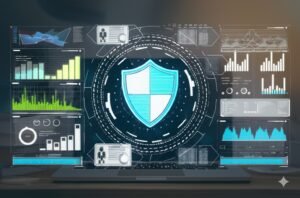In today’s digital age, cybersecurity has become one of the most critical and in-demand fields. From protecting sensitive data to thwarting cyberattacks, cybersecurity professionals play a vital role in safeguarding our increasingly connected world. But with the rapid growth of this industry comes an important question: Does cybersecurity require a degree?
While traditional education has long been seen as the gateway to a successful career, the evolving landscape of cybersecurity suggests there are multiple paths to success. In this blog post, we’ll explore five key insights that will help you navigate this question. Along the way, we’ll draw interesting parallels between cybersecurity and emerging fields like predictive analytics, behavioral support, and personalized nutrition —showing how these disciplines can inform your journey into cybersecurity.
Whether you’re considering a career change, exploring educational options, or simply curious about the field, this guide is here to help. Let’s dive in!
The Traditional Path – Is a Degree Necessary?
The Role of Degrees in Cybersecurity
Historically, a degree in computer science, information technology, or cybersecurity has been considered the gold standard for entering the field. A bachelor’s degree provides foundational knowledge in areas like networking, programming, and systems architecture—all of which are crucial for understanding cybersecurity threats and solutions.
However, the cybersecurity landscape is changing faster than ever. Companies are beginning to recognize that while degrees offer theoretical knowledge, they don’t always prepare candidates for real-world challenges. For instance, a degree might teach you how encryption works, but it won’t necessarily train you to respond to a live ransomware attack.

Current Trends
The demand for cybersecurity professionals far outpaces the supply, leading employers to prioritize skills over formal education. According to a recent survey by (ISC)², nearly 60% of cybersecurity professionals do not have a degree specifically in cybersecurity. Instead, they’ve built their careers through certifications, hands-on experience, and self-directed learning.
Case Studies
Take Jane Doe, for example—a former teacher who transitioned into cybersecurity after completing online courses and earning industry-recognized certifications. Or consider John Smith, a seasoned IT professional who leveraged his existing network security expertise to land a senior cybersecurity role without additional formal education.
Predictive Analytics Connection
Predictive analytics plays a fascinating role here. By analyzing job market trends and skill requirements, predictive models can identify which educational pathways lead to the best outcomes. For instance, if data shows that certain certifications consistently correlate with higher salaries, individuals can focus their efforts accordingly.
Alternative Education Paths in Cybersecurity
Certifications and Bootcamps
For those seeking alternatives to traditional degrees, certifications and bootcamps have emerged as powerful tools. Popular certifications like Certified Information Systems Security Professional (CISSP) , Certified Ethical Hacker (CEH) , and CompTIA Security+ are widely recognized by employers and often serve as stepping stones to lucrative careers.
Boot camps, on the other hand, offer intensive, short-term training programs designed to equip students with practical skills quickly. Platforms like Cybrary, Hack The Box, and Fullstack Academy provide immersive experiences that simulate real-world scenarios.
Online Learning Platforms
Online platforms such as Coursera, Udemy, and edX have democratized access to cybersecurity education. These platforms offer everything from beginner-friendly introductions to advanced topics like penetration testing and cloud security. Many courses are created and taught by industry experts, ensuring relevance and quality.
Behavioral Support Angle
Understanding human behavior is key to effective learning. Just as personalized coaching helps athletes improve performance, tailored educational approaches can enhance learning outcomes in cybersecurity. For example, adaptive learning technologies use behavioral data to adjust course content based on individual progress and preferences.
Real-Life Success Stories
Meet Alex Johnson, a stay-at-home parent who became a cybersecurity analyst after completing a six-month bootcamp. Or Sarah Lee, who used free resources from YouTube and GitHub to build her portfolio and secure a job at a Fortune 500 company. Their stories prove that passion and persistence often outweigh formal credentials.
Skills Over Degrees – What Employers Really Want
Key Skills in Demand
Employers value specific technical skills above all else. Some of the most sought-after competencies include:
- Network Security: Understanding firewalls, intrusion detection systems, and secure protocols.
- Ethical Hacking: Identifying vulnerabilities before malicious actors exploit them.
- Incident Response: Managing and mitigating the impact of cyberattacks.
- Cloud Security: Protecting data stored in cloud environments.
Soft skills like problem-solving, communication, and teamwork are equally important. After all, cybersecurity isn’t just about writing code—it’s about collaborating with teams and explaining complex issues to non-technical stakeholders.
Employer Perspectives
According to a report by Burning Glass Technologies, 84% of cybersecurity job postings emphasize skills over degrees. Hiring managers care more about what you can do than where you learned to do it. This shift reflects a growing recognition that diverse backgrounds bring fresh perspectives to the field.
Personalized Nutrition Analogy
Think of building a cybersecurity skill set like crafting a personalized nutrition plan. Just as no two people need the exact same diet, no two cybersecurity professionals need the exact same qualifications. Tailor your learning journey to address your unique strengths and goals.
Tips for Skill Development
- Start with free resources like Capture the Flag (CTF) challenges to practice ethical hacking.
- Build a GitHub repository showcasing your projects.
- Network with professionals through LinkedIn and industry events.

The Role of Experience in Cybersecurity Careers
Hands-On Experience vs. Theoretical Knowledge
There’s no substitute for hands-on experience. While textbooks teach theory, real-world challenges demand adaptability and creativity. Participating in internships, freelance gigs, or open-source projects allows you to apply what you’ve learned in dynamic environments.
Building a Portfolio
A strong portfolio demonstrates your capabilities to potential employers. Include case studies of projects you’ve completed, screenshots of CTF victories, or links to GitHub repositories. Highlight any contributions to open-source initiatives or community-driven security efforts.
Predictive Analytics in Career Growth
Predictive analytics can also forecast your career trajectory. Tools like LinkedIn’s Career Explorer analyze your current skills and suggest roles you might qualify for—or areas where further development could unlock new opportunities.
Networking and Mentorship
Building relationships with experienced professionals can accelerate your growth. Seek mentors who can provide guidance, share insights, and introduce you to valuable contacts. Joining organizations like ISACA or OWASP can expand your network significantly.
Future Trends Shaping Cybersecurity Education
Emerging Technologies
Advancements in artificial intelligence (AI), machine learning (ML), and the Internet of Things (IoT) are transforming cybersecurity. As these technologies evolve, so too must the skills required to protect them. Continuous learning will be essential to staying ahead of the curve.
Integration with Other Fields
Cybersecurity increasingly intersects with other disciplines. For instance:
- Predictive Analytics: Anticipating cyber threats using big data.
- Behavioral Science: Understanding user habits to design better security protocols.
- Personalized Nutrition: Leveraging wearable tech to protect health-related data.
These connections highlight the interdisciplinary nature of modern cybersecurity.
Lifelong Learning Mindset
Given the pace of innovation, adopting a lifelong learning mindset is crucial. Stay updated on industry trends, attend conferences, and pursue ongoing education. Remember, the best cybersecurity professionals are perpetual students.
Future Outlook
As automation takes over routine tasks, human-centric skills like critical thinking and ethical decision-making will become even more valuable. Tomorrow’s leaders will blend technical prowess with emotional intelligence, creating a holistic approach to cybersecurity.
Conclusion
We’ve explored five key insights into whether cybersecurity requires a degree—and the answer is clear: No, a degree is not mandatory . While formal education can provide a solid foundation, alternative paths like certifications, bootcamps, and hands-on experience are equally valid.
By focusing on acquiring the right skills, gaining practical experience, and staying adaptable, anyone can thrive in this exciting field. Whether you’re inspired by predictive analytics, behavioral science, or personalized nutrition, there’s room for your unique perspective in cybersecurity.
So take the first step today. Research courses, connect with professionals, and start building your portfolio. Your future in cybersecurity awaits!

